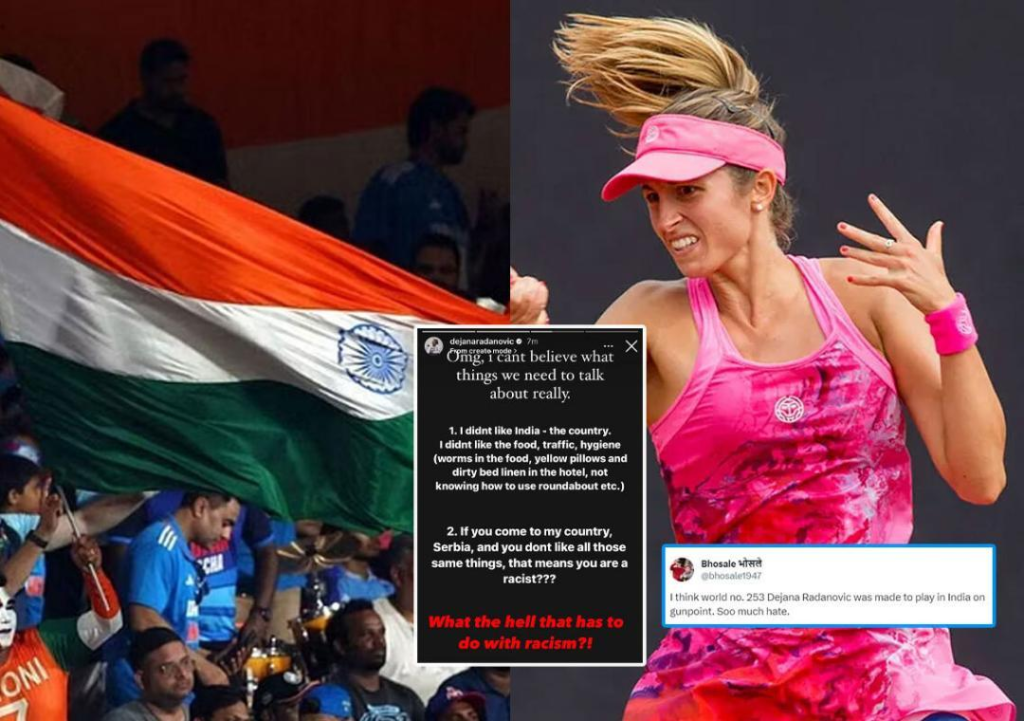The tennis player Dejana Radanovic from Serbia, who ranks 245th in the world, recently said negative things about India while there for tennis tournaments. She used Instagram to say she didn’t enjoy the country, mentioning issues with the food, traffic, and cleanliness at her hotel, like finding worms in the food and dirty bedding.
Dejana Radanovic’s comments sparked controversy and outrage among Indian fans, who were quick to defend their country. Many took to social media to express their disappointment in the tennis player’s remarks, with some even questioning her professionalism and sportsmanship.

While Radanovic has since apologized for her comments, this incident highlights a growing trend of athletes making negative statements about countries they visit. In recent years, there have been several instances of athletes making controversial comments about host countries, leading to heated debates and discussions.
One reason for this trend could be the pressure that athletes face while competing in international tournaments. They are under tremendous physical and mental stress, pushing themselves to perform at their best against tough opponents. This immense pressure can sometimes lead to frustration and
Radanovic also told her followers not to drink the water from the tap or eat unpeeled fruits in India. She explained that she got very sick from eating fruit during a previous visit. When she left India, she said on Instagram that she didn’t want to return.
However, it’s important to note that these negative statements do not represent the entire country and its people. India is a diverse and vibrant nation, with a rich history and culture. While there may be some issues with hygiene or infrastructure in certain areas, this does not define the country as a whole.
Moreover, athletes have the privilege of traveling and competing in different parts of the world, experiencing different cultures and ways of life. It’s important for them to use their platform responsibly and not make sweeping statements that can offend or misrepresent a country.
At the same time, it’s crucial for host countries to ensure that athletes are provided with suitable living conditions and amenities during their stay. This includes maintaining clean facilities, providing safe food options, and addressing any concerns or complaints promptly.
In the end, it’s important for both athletes and host countries to have mutual respect and understanding. While negative incidents like Radanovic’s comments can create controversy, they also provide an opportunity for dialogue and cultural exchange. Through open communication and empathy, we can bridge cultural gaps and promote a positive environment in the world of sports.
Her comments upset many people online who thought her words were unkind or even racist. Radanovic defended herself, saying she was just talking about things she did not like in India and questioned how that could be seen as racist.
This incident also raises questions about cultural sensitivity and awareness among athletes. While competing in international tournaments, they are not just representing themselves, but their country as well. It’s important for them to educate themselves about the cultures and customs of the countries they visit, and avoid making insensitive or offensive remarks.
Furthermore, negative statements from athletes can have a significant impact on the tourism industry of a country. With the rise of social media, these comments can spread quickly and deter future visitors from exploring a new destination.
In conclusion, athletes have a responsibility to be respectful and mindful when speaking about the countries they visit for tournaments. At the same time, host countries should strive to provide a comfortable and welcoming environment for their guests. By promoting cultural understanding and mutual respect, we can create a positive and inclusive environment in the world of sports.
So let’s strive towards promoting a spirit of unity and camaraderie among athletes, and celebrate the diversity of our world through sports. Let’s use these incidents as opportunities for growth and learning, rather than causing division and controversy.
As Dejana Radanovic said in her apology, “I hope this brings us all together, not apart.” The passion and dedication of athletes should unite us, not divide us. Let’s focus on the positive aspects of our interactions with each other and continue to spread love and respect through sports.
For more insightful articles and discussions on sports culture, athlete behavior, and the intersection of competition and cultural sensitivity, visit our website at Newzvilla.